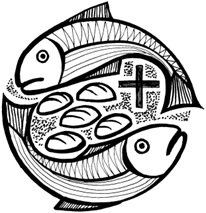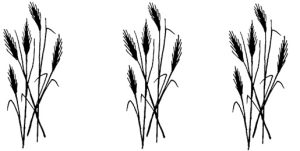Leviticus 23:9-14, Matthew 15:32-29
In the name of the Living God, loving Father, risen Son and ever present Holy Spirit. Amen
Today we are keeping Lammas – Marking the first fruits of the harvest in the festivals of the agricultural year. In our Old Testament reading we had Moses hearing from God the importance of giving thanks for the first fruits of the harvest when they entered the promised land. It was at a time when God gave Moses a lot of instructions for the people of God and in some depth too. Setting out the festivals they were to mark – all five of them and the part we are thinking about the blessing of the first fruits is the start of the countdown to the festival of weeks, seven weeks later! It is important to realise this was all given to Moses by God significantly before Joshua led them into the promised land, and by the time these instructions need to be followed, Moses had been dead some time!
The basis of the ritual described for the first fruits of the harvest is to make a present for God FIRST. A gift of praise in thanks for God’s blessing on the land. There is a ritual order of different things here described to make sure the offerings achieve this purpose. The sheaf, then a lamb, then a grain offering of flour mixed with oil and a drink offering of wine and none of the new crop must be consumed until all this is done. What all this is doing is acknowledging God’s ownership of the land and its harvest.
If the people of God were to eat the harvest before giving thanks for it, they viewed this as a direct affront to God for having blessed their land – hence the importance of this feast. By giving thanks to God for the first fruits, the people of God are expressing their deep gratitude for the harvest that God has given them, recognising their reliance on God in everything.
In our days, we too can lose sight of where we stand on God’s world. The world belongs to God and everything that lives on it and grows on it. At best we are stewards of the world – here to look after it (and currently in all honesty, we are not always doing a particularly good job of that). In our market economy we are often at least one, two or more steps removed from the actual harvesting. We could do with a bit more humility and understanding on our reliance on God in all things and the beautiful world God made for us and for the things we often take for granted.
These are VERY challenging times for those who do produce the food we eat as I said at Rogation in May. In relation to all of that which I am not going to repeat, can we please pray for the protection and safe transit of the grain supplies in Odessa to where it is most needed. An agreement has been reached to allow this to be shipped out which must be an answer to prayer. But let’s keep going with the prayers as the grain begins to be moved.
As I have said a number of times before, I think it is important to give thanks for all we have and recognise we have a lot to be thankful for! Engaging in ritual can help us do this, just as much as it helped the people of God in the times of Leviticus. We are also remembering to give thanks symbolically today as we gather our harvests for 2022 (whatever they may be).
I do know that much of the grain harvesting around here started a bit earlier than this because of the dry weather this year! We need to find ways to pray and give thanks for whatever it is as this is really important. While I am on this topic – which coincidentally is probably also about 7 weeks away too, at our harvest festivals, I want everyone to bring something to represent Harvest for them in 2022. Obviously it could be something we have grown, but it could also represent something else from our lives that particularly characterises a harvest for 2022. The more creative the better! I am warning us now so we have some time to think about it!!! This applies to both church harvests (26th Sept in Pen Selwood and 2nd October in Wincanton).
Moving to thinking about that familiar but not quite gospel story. 
-
Wasn’t it five thousand men, beside the women and children not four thousand?
-
And wasn’t it five loaves and two small fish, not seven and a few small fish?
-
And wasn’t it twelve baskets and not seven?
(And in fact though we can’t see it the word for basket is different too.) The word for basket in the story of feeding of the five thousand is Kophinos. This is a typical thin necked flask shaped basket used by Jewish people of Jesus’ day. But the word for basket is sphurides in the feeding of the four thousand story. This kind of basket is much more like a picnic hamper routinely used by the gentile people of Jesus’s day!
There are 2 stories – First feeding five thousand and then feeding four thousand (plus women and children). The two stories are describing separate events about a chapter apart in Matthew’s gospel. But also if you unpick the story, Jesus has done quite a lot of travelling between the two events and time has passed. Distances something like going from Bristol to London via Manchester. One commentary I read, felt that the feeding of the five thousand took place in Spring, and the four thousand in high Summer! So months had passed too.
The most critical point to grasp here is the people witnessing these two amazing events are different. The feeding of the five thousand was to a predominantly Jewish crowd, though Matthew in his gospel is not explicit about this (and his intent was not in this direction). However, digging under the covers, before this Jesus has been travelling extensively in gentile areas and this gathering will include people from there who had followed him. The different baskets also reflect this very clearly.
This shows that Jesus had come to feed the hungry. Not just the hungry who were descendants of Moses. But everyone! We see mercy and compassion in Jesus’ acts here and a pointer to the heavenly bread we share week in and week out in Communion. To apply to our situation Jesus is involved in feeding the hungry of the nations. As Christians we need to do what we can to feed the nations of the world following the example of Jesus. In the difficult days ahead, let’s make sure we live as lightly as possible on our good earth, have a serious thankfulness habit and encourage in whatever ways we can the distribution of food to those who most need it. We need to promote fairer sharing of resources and better stewardship of the world God has blessed us with. Amen
References
The New Revised Standard Version (Anglicized Edition), copyright 1989, 1995
Word biblical Commentary – Leviticus by John E Hartley and Matthew Donald A Hagner 1995
The gospel of Matthew – William Barclay 1975 Saint Andrew’s Press


